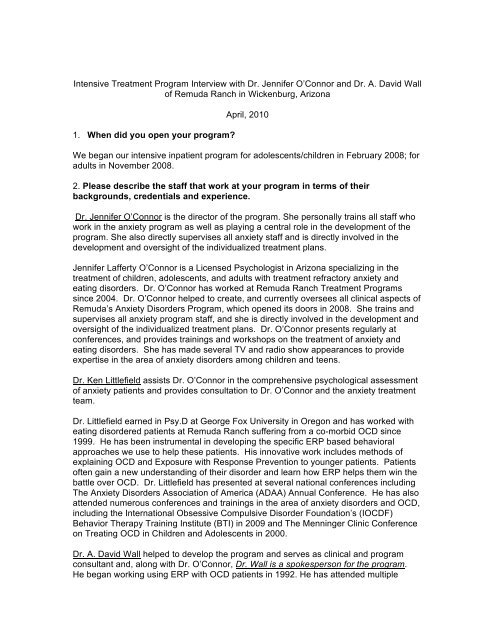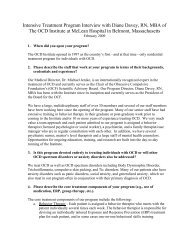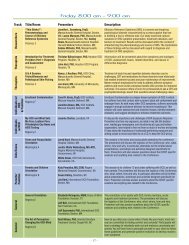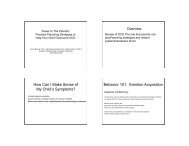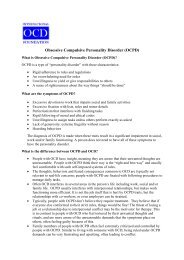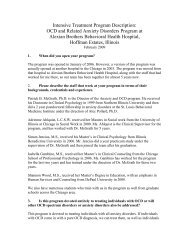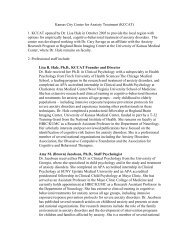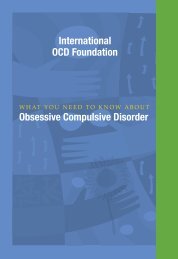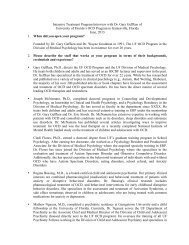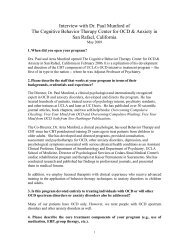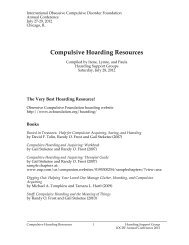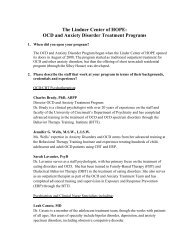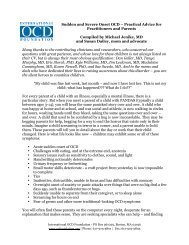When Did You Open Your Program? - Obsessive-Compulsive ...
When Did You Open Your Program? - Obsessive-Compulsive ...
When Did You Open Your Program? - Obsessive-Compulsive ...
Create successful ePaper yourself
Turn your PDF publications into a flip-book with our unique Google optimized e-Paper software.
Intensive Treatment <strong>Program</strong> Interview with Dr. Jennifer O’Connor and Dr. A. David Wall<br />
of Remuda Ranch in Wickenburg, Arizona<br />
1. <strong>When</strong> did you open your program<br />
April, 2010<br />
We began our intensive inpatient program for adolescents/children in February 2008; for<br />
adults in November 2008.<br />
2. Please describe the staff that work at your program in terms of their<br />
backgrounds, credentials and experience.<br />
Dr. Jennifer O’Connor is the director of the program. She personally trains all staff who<br />
work in the anxiety program as well as playing a central role in the development of the<br />
program. She also directly supervises all anxiety staff and is directly involved in the<br />
development and oversight of the individualized treatment plans.<br />
Jennifer Lafferty O’Connor is a Licensed Psychologist in Arizona specializing in the<br />
treatment of children, adolescents, and adults with treatment refractory anxiety and<br />
eating disorders. Dr. O’Connor has worked at Remuda Ranch Treatment <strong>Program</strong>s<br />
since 2004. Dr. O’Connor helped to create, and currently oversees all clinical aspects of<br />
Remuda’s Anxiety Disorders <strong>Program</strong>, which opened its doors in 2008. She trains and<br />
supervises all anxiety program staff, and she is directly involved in the development and<br />
oversight of the individualized treatment plans. Dr. O’Connor presents regularly at<br />
conferences, and provides trainings and workshops on the treatment of anxiety and<br />
eating disorders. She has made several TV and radio show appearances to provide<br />
expertise in the area of anxiety disorders among children and teens.<br />
Dr. Ken Littlefield assists Dr. O’Connor in the comprehensive psychological assessment<br />
of anxiety patients and provides consultation to Dr. O’Connor and the anxiety treatment<br />
team.<br />
Dr. Littlefield earned in Psy.D at George Fox University in Oregon and has worked with<br />
eating disordered patients at Remuda Ranch suffering from a co-morbid OCD since<br />
1999. He has been instrumental in developing the specific ERP based behavioral<br />
approaches we use to help these patients. His innovative work includes methods of<br />
explaining OCD and Exposure with Response Prevention to younger patients. Patients<br />
often gain a new understanding of their disorder and learn how ERP helps them win the<br />
battle over OCD. Dr. Littlefield has presented at several national conferences including<br />
The Anxiety Disorders Association of America (ADAA) Annual Conference. He has also<br />
attended numerous conferences and trainings in the area of anxiety disorders and OCD,<br />
including the International <strong>Obsessive</strong> <strong>Compulsive</strong> Disorder Foundation’s (IOCDF)<br />
Behavior Therapy Training Institute (BTI) in 2009 and The Menninger Clinic Conference<br />
on Treating OCD in Children and Adolescents in 2000.<br />
Dr. A. David Wall helped to develop the program and serves as clinical and program<br />
consultant and, along with Dr. O’Connor, Dr. Wall is a spokesperson for the program.<br />
He began working using ERP with OCD patients in 1992. He has attended multiple
conferences and workshops on OCD and Anxiety Disorders, including IOCDF’s Behavior<br />
Therapy Institute.<br />
Patients are also seen at least 6 times per week by their psychiatric provider. These<br />
providers have been trained in the latest psychopharmacological medications for OCD<br />
and other anxiety disorders. Pharmacological interventions are only used when<br />
indicated. All psychiatric providers are supervised by Dr. Kevin Wandler, MD. Dr.<br />
Wandler is board certified by the American Board of Psychiatry and Neurology in<br />
General Psychiatry and has Added Qualifications in Addiction Psychiatry. Dr. Wandler<br />
has been treating anxiety patients for over 20 years. He was named one of Arizona’s<br />
best doctors by Phoenix Magazine.<br />
3. Is this program devoted entirely to treating individuals with OCD or will other<br />
OCD spectrum disorders or anxiety disorders also be addressed<br />
Our intensive inpatient program is designed for individuals with OCD as well as OC<br />
Spectrum and Anxiety Disorders. The modalities are individualized based on the<br />
diagnosis and needs of each patient.<br />
4. Please describe the core treatment components of your program (e.g., use of<br />
medication, ERP, group therapy, etc.).<br />
Cognitive Behavioral Therapy. Cognitive Behavioral Therapy (CBT) forms the core of<br />
Remuda Ranch’s treatment curriculum. Remuda’s program relies on Exposure with<br />
Response Prevention (ERP) as the primary CBT intervention for OCD and OCD<br />
spectrum disorders. ERP involves direct exposure to feared situations plus prevention of<br />
ineffective behaviors such as compulsions or avoidance.<br />
Prior to ERP, patients receive extensive psycho-education, facilitating insights into their<br />
thinking and behavior. ERP then commences on an individualized basis depending upon<br />
the specific anxiety issues.<br />
Patients also learn about cognitive distortions common in anxiety disorders: overestimation<br />
of harm, risk, and danger; over-estimation of responsibility; intolerance of<br />
uncertainty; magical and all-or-nothing thinking. Cognizant of their thought distortions,<br />
patients learn to “CCC”—catch, challenge, and change—these thoughts as they occur<br />
throughout the day.<br />
Supplemental Therapies. ERP is the primary and essential aspect in the successful<br />
treatment of OCD and related anxiety disorders. Historically, stress reduction and other<br />
forms of therapy have often been inappropriately used as primary interventions in the<br />
treatment of OCD and OC related disorders. Relaxation and other techniques are<br />
typically not effective with these types of disorders. However, as with any condition,<br />
stress typically exacerbates symptoms of the primary disorder (even purely physiological<br />
disorders such as diabetes). Lowering “background” stress; that is, the everyday stress<br />
of our lives, as opposed to OCD/Anxiety Disorder specific stress, indirectly helps to<br />
alleviate the anxiety disorder problems and, in general, improves the overall quality of<br />
life.<br />
In keeping with our philosophy of treating the whole person, we often incorporate<br />
interventions such as Acceptance Commitment Therapy (ACT) and, Dialectic Behavior
Therapy (DBT). ACT helps the individual to understand and deal with the fact that a<br />
certain amount of anxiety is inevitable for all of us. In the words of C.S. Lewis, "Try to<br />
exclude the possibility of suffering [anxiety]…and you find that you have excluded life<br />
itself." However, ACT is not simply passive-acceptance; rather ACT combines<br />
acceptance and awareness with behavioral change strategies as a means of increases<br />
psychological and social flexibility (i.e., living a fuller life). Through DBT, patients<br />
develop a strong repertoire of emotion regulation, distress tolerance, and interpersonal<br />
effectiveness skills that allow them to manage distressing more effectively.<br />
Group Therapy. Anxiety Disorders often isolate victims from social contexts, such as<br />
friends and family. Reintegration is important in recovery from debilitating anxiety<br />
disorders. With social phobia, reintegration is particularly crucial. Remuda provides<br />
patients with frequent opportunities for exposure to social interaction. For those with<br />
social phobia, exposure is more gradual to allow time for habituation. Some patients<br />
need social skills training due to delays in social development related to their anxiety<br />
disorders. Each patient has an individualized plan for social reintegration through<br />
participation in group therapy, recreation, and off-site outings with peers.<br />
Biological and Medical Components of Treatment. All patients at Remuda’s Anxiety<br />
Disorders <strong>Program</strong> are carefully evaluated by a primary care provider and a psychiatric<br />
provider upon admission to assess for medical issues that may be associated with the<br />
anxiety disorder. If deemed appropriate, patients are provided with the opportunity to<br />
utilize psychotropic medications to manage their specific symptoms. Each patient is<br />
seen on at least 6 times per week by a psychiatric provider so that the effects of<br />
medications can be carefully monitored and assessed on an on-going basis.<br />
Family Work. Once again, our patients are not “OCD”, they are individuals who have<br />
OCD. Maintaining healthy family relationships and communication has become more<br />
and more difficult in our high pressure society. OCD and other Anxiety Disorders can<br />
significantly intensify family problems. All patients and their families engage in a period<br />
of intensive family therapy focused on teaching the family how to support the person with<br />
OCD in the process of recovery. Families are provided with psychoeducation to help<br />
them understand the symptoms of their loved one’s anxiety disorder, as well as the<br />
purposes and methods of ERP treatment. Family members are provided with support in<br />
recognizing ways that they may be accommodating or enabling their loved one’s<br />
unhealthy coping behaviors, and a plan is established to prevent relapse upon return to<br />
the home/family environment. Families are also provided with opportunities to improve<br />
communication skills, resolve conflicts, and engage in the process of forgiveness with<br />
one another.<br />
Christian Context. Remuda’s treatment occurs in a milieu of non-denominational<br />
Christianity. Patients attend 30-40 minute chapels 6 days per week with messages<br />
about grace, forgiveness, and love that are accessible to people of any faith. Staff<br />
members are available, such as a chaplain, to pray with patients and discuss issues<br />
related to their spiritual growth. Remuda treats patients from all faith backgrounds, and<br />
patients from different faith backgrounds, or no religious background, report equally high<br />
levels of satisfaction with our program and obtain positive outcomes.<br />
5. Please describe the treatment planning process at your program.
Treatment planning begins before the individual decides whether to come to Remuda.<br />
An admissions counselor conducts a lengthy telephone screening process with the<br />
patient and key family members, which is then reviewed by a psychiatrist. We obtain<br />
records from previous hospitalizations, other intensive treatments, and outpatient<br />
providers. We then contact the individual with our recommendations as to whether this<br />
treatment is right for them.<br />
Once the patient arrives, Remuda relies on a multi-disciplinary team to address the<br />
complex and varied needs of each patient. Each patient is evaluated by a master’s or<br />
doctoral level therapist, licensed psychologist, psychiatric provider, registered dietician,<br />
primary care provider, and registered nurse upon admission to identify treatment goals<br />
specific to each discipline. The multi-disciplinary team meets on a regular basis<br />
throughout the remainder of the length of stay in order to assess progress towards each<br />
goal indentified in the treatment plan. Patients are provided with opportunities to add<br />
input regarding their personal treatment goals.<br />
A licensed psychologist experienced in conceptualizing and treating anxiety disorders<br />
will carefully assess the unique anxiety symptoms of each patient and will design an<br />
individualized behavioral therapy plan to address anxiety symptoms including<br />
obsessions, compulsions, and avoidance behaviors. The evaluation includes a detailed<br />
interview with patient, and a battery of valid and reliable psychometric tests to obtain<br />
objective data for use in treatment planning. At various intervals, patients retake tests to<br />
assess changes in symptom severity and allow adjustments to treatment plans in cases<br />
of less than optimal progress.<br />
Discharge planning begins before the person arrives and continues throughout their<br />
stay, culminating in a detailed plan with first outpatient appointments set before the<br />
patient leaves inpatient treatment at Remuda. Each member of the patient’s treatment<br />
team communicates with their counterpart on the outpatient team, if any, and records of<br />
inpatient treatment are sent in a timely manner.<br />
6. If someone has a co-morbid condition, can he or she participate in your<br />
program Will there be treatment for the co-morbid condition If so, can you give<br />
an example<br />
Yes. Individuals with co-morbid conditions that do not prohibit the patient’s ability to<br />
engage in the treatment program and to be a part of a community (group of patients) are<br />
more than welcome. Most patients have comorbid diagnoses (e.g., depression).<br />
Patients with social phobia are often helped tremendously by the supportive therapeutic<br />
community.<br />
Each patient has a team of professionals who not only treat the anxiety disorder, but<br />
address co-occurring issues such as depression and substance use. Patients have the<br />
opportunity to participate in specialized group sessions to address co-occurring<br />
conditions. Specialized groups include Substance Abuse Group, Body Image Group,<br />
and<br />
Trauma Recovery Group. Co-morbid conditions are also addressed on an individual<br />
basis by the primary therapist, psychiatric provider, psychologist, registered dietician, or<br />
primary care provider throughout the course of treatment.
7. Are parents, family members, friends, teachers, etc. included in the treatment<br />
If yes, please describe how.<br />
Family relationships are powerfully impacted by an anxiety disorder. Upon admission to<br />
the treatment program, parents are strongly encouraged to meet in person with their<br />
child’s treatment team to provide detailed information about family relationships and<br />
dynamics. Families of child and adolescent patients are asked to participate in weekly<br />
teleconference therapy sessions with their child to improve communication between<br />
family members and address problematic issues.<br />
Spouses of adult patients, and parents/siblings of child/adolescent patients, attend an<br />
on-site Family Experience that involves intensive psycho-education on anxiety disorders,<br />
exposure therapy, and relapse prevention. Remuda recognizes the importance of<br />
making family members an integral part of the treatment process.<br />
8. How often do patients in the program meet with staff individually How long are<br />
these individual sessions<br />
Patients are provided meet with a psychiatric provider at least 6 times per week and<br />
twice weekly individual therapy sessions with their primary therapist. Patients are<br />
provided with daily opportunities to engage in ERP challenges during CBT group and<br />
during off-site exposure therapy sessions. They are provided with immediate support<br />
from either a Behavioral Health Technician, primary therapist, or psychologist during<br />
these ERP sessions.<br />
9. Is there a set time period for a patient’s treatment in the program What is the<br />
overall time commitment to the program (for example, attend daily for three<br />
weeks) How much flexibility is there in extending someone’s stay if needed<br />
Our lengths of stay are typically 45 days at the inpatient level. Treatment may be<br />
extended if deemed necessary by our treatment team.<br />
10. Is there a homework or “self-directed” component to the treatment<br />
Patients are always provided with an opportunity to confront fears for the first time with<br />
the immediate support of their therapist. However, after developing a sense of mastery<br />
over these fears, patients are asked to practice confronting these fears through selfguided<br />
exposures throughout the course of their stay. Self-guided exposure therapy is<br />
an important component of relapse prevention because it creates a foundation of<br />
confidence that allows patients to transition back into their independent life following<br />
discharge from the inpatient treatment program.<br />
11. Please describe the relapse prevention strategies you use in your program.<br />
The goal of treatment is to not only help our patients get healthy, but stay healthy. We<br />
provide relapse prevention education to prepare for a successful transition into daily life.<br />
We educate patients and family members about the importance of maintaining the gains<br />
made during treatment through ongoing outpatient care and regular self-guided<br />
exposure practice for those with phobias and obsessive compulsive symptoms. We<br />
assist each woman and girl in creating a complete aftercare plan prior to discharge.
12. What kind of follow-up do you do for those who complete your program Will<br />
the members or your treatment team be in contact with or willing to consult with<br />
the individual’s regular treatment provider(s)<br />
Our follow-up coordinator will contact each patient five times within the first year after<br />
treatment. The patient’s regular treatment providers will be contacted three times during<br />
the course of the inpatient stay and will be provided with detailed records upon the<br />
patient’s discharge in order to ensure continuity of care. Our team remains available for<br />
consultation calls with all aftercare providers. In addition, we contact patients at one and<br />
five years post-discharge with outcome questionnaires designed to measure their longterm<br />
success.<br />
13. Do you offer a sliding fee scale or scholarships for those who cannot afford<br />
your program<br />
We offer financial assistance in the form of a sliding fee scale and partial scholarships to<br />
those who cannot afford the full cost of our program or whose insurance will not cover<br />
the program in full.<br />
14. Does your program only work with individuals who are local or are there<br />
arrangements for those who come from farther away (for example, lodging<br />
arrangements)<br />
Our inpatient programs are located in Arizona. The majority (greater than 90%) of our<br />
patients are not local, but come from every state in the US, Canada, and other countries.<br />
Because our programs are inpatient, housing is an included aspect of treatment.<br />
Remuda also maintains Family Residences for family members who travel to our<br />
campuses for the Family Experience portion of the program.<br />
15. Please add any information you think would be helpful in describing the<br />
unique aspects of your program if this has not been covered in the questions<br />
above.<br />
Remuda’s program is grounded in a holistic philosophy that views each patient as a<br />
unique individual with complex needs. Remuda’s providers are trained to view patients<br />
from a bio-psycho-social- spiritual perspective that takes into account the complexity of<br />
each individual. ERP can sometimes be a very mechanical type of treatment. We never<br />
forget that we are not treating a disorder; we are treating a person who has a disorder.<br />
Patients are not viewed as diagnostic labels or as “problems” to be fixed and solved.<br />
Rather, each patient is viewed as a whole person who possesses unique strengths,<br />
values, beliefs, and goals. In the Remuda model of treatment, the individual patient is<br />
guided towards a trajectory of personal growth that is not limited to symptom reduction<br />
alone. This is undertaken in an atmosphere of non-denominational Christianity,<br />
emphasizing God’s love for each person that God has created.<br />
We also utilize a variety of innovative therapies throughout treatment to help our patients<br />
with their therapeutic goals and to encourage them to learn how to enjoy life.<br />
Experiential therapies which may include:<br />
• Equine<br />
• Art<br />
• Challenge Course & Recreation


